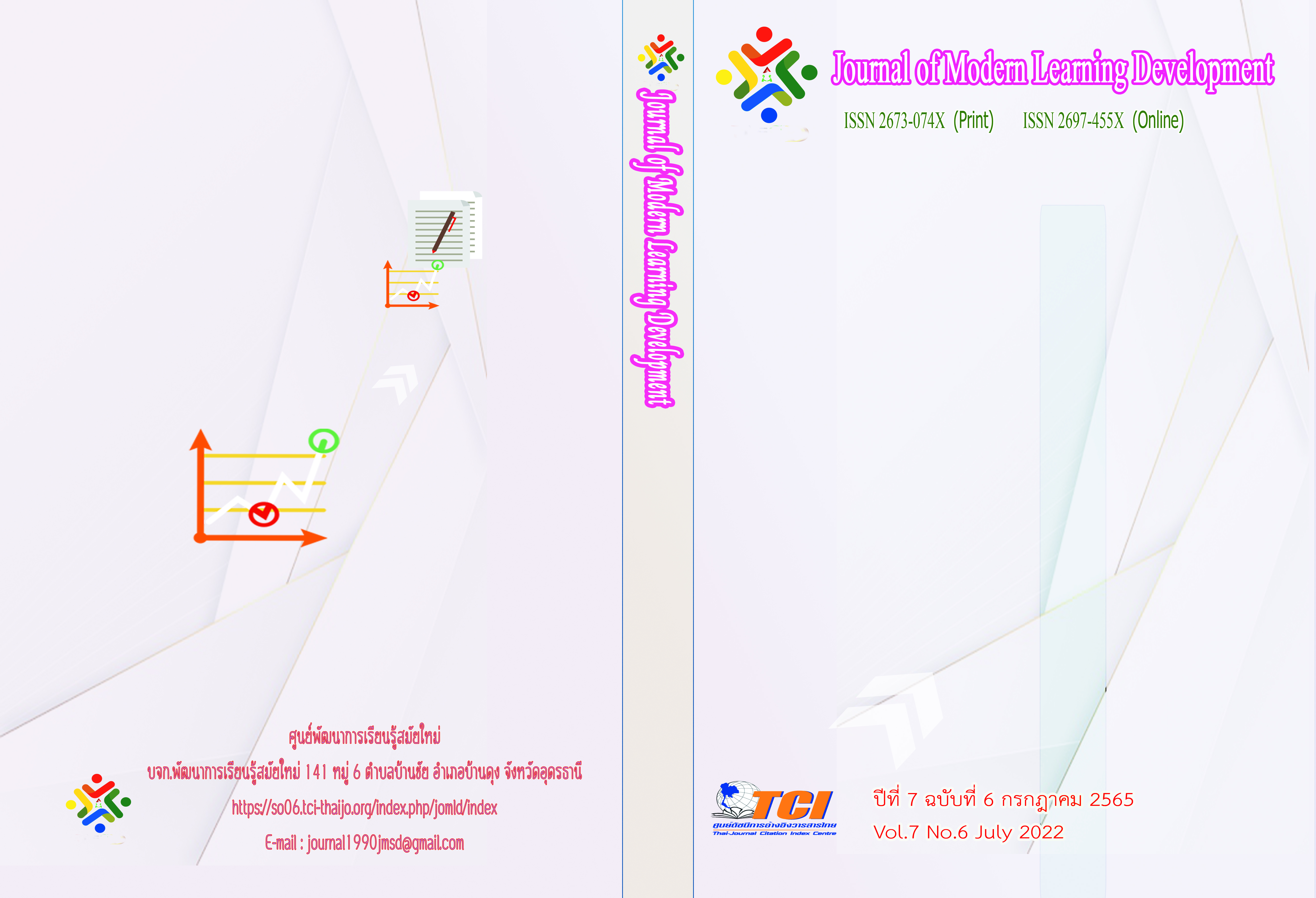แนวทางการพัฒนาภาวะผู้นำการเปลี่ยนแปลงตามหลักพรหมวิหาร 4 ของผู้บริหารสถานศึกษาในสังกัดสำนักงานเขตพื้นที่การศึกษาประถมศึกษาขอนแก่น เขต 4
Main Article Content
บทคัดย่อ
การวิจัยในครั้งนี้มีวัตถุประสงค์เพื่อศึกษา (1) ศึกษาสภาพการพัฒนาภาวะผู้นำการเปลี่ยนแปลงตามหลักพรหมวิหาร 4 ของผู้บริหารสถานศึกษาในสังกัดสำนักงานเขตพื้นที่การศึกษาประถมศึกษาขอนแก่น เขต 4 (2) เสนอแนวทางการพัฒนาภาวะผู้นำ การเปลี่ยนแปลงตามหลักพรหมวิหาร 4 ของผู้บริหารสถานศึกษาในสังกัดสำนักงานเขตพื้นที่การศึกษาประถมศึกษาขอนแก่น เขต 4 กลุ่มตัวอย่างได้แก่ ผู้บริหารสถานศึกษาและหัวหน้างาน 4 ฝ่าย ของโรงเรียนในสังกัดสำนักงานเขตพื้นที่การศึกษาประถมศึกษาขอนแก่น เขต 4 ปีการศึกษา 2564 จำนวน 269 คน เครื่องมือที่ใช้ในงานวิจัยเป็นแบบสอบถามในการวิจัยเชิงปริมาณ มีค่าความเชื่อมั่นทั้งฉบับเท่ากับ 0.93 และใช้แบบสัมภาษณ์ในการวิจัยเชิงคุณภาพ สถิติที่ใช้ในงานวิจัยได้แก่ ความถี่ ค่าร้อยละ ค่าเฉลี่ย ค่าส่วนเบี่ยงเบนมาตรฐาน
ผลการวิจัย พบว่า 1) แนวทางการพัฒนาภาวะผู้นำการเปลี่ยนแปลงตามหลักพรหมวิหาร 4 โดยภาพรวมมีการปฏิบัติอยู่ในระดับมากที่สุด และรายด้านที่มีการปฏิบัติสูงสุด คือ ด้านการมีอิทธิพลอย่างมีอุดมการณ์ ตามหลักพรหมวิหาร 4 รองลงมาคือด้านการสร้างแรงบันดาลใจ ตามหลักพรหมวิหาร 4 ด้านการคำนึงถึงความเป็นปัจเจกบุคคล ตามหลักพรหมวิหาร 4 ตามลำดับ ส่วนด้านที่มีการปฏิบัติต่ำสุด คือด้านการกระตุ้นทางปัญญา ตามหลักพรหมวิหาร 4
2) ข้อเสนอแนะแนวทางการพัฒนาภาวะผู้นำการเปลี่ยนแปลงตามหลักพรหมวิหาร 4 คือ
2.1) ด้านการมีอิทธิพลอย่างมีอุดมการณ์ ผู้บริหารควรเป็นแบบอย่างที่ดีให้กับผู้ใต้บังคับบัญชา สร้างการยอมรับให้กับผู้ร่วมงาน มีวิสัยทัศในการทำงาน 2.2) ด้านการสร้างแรงบันดาลใจ ผู้บริหารควรมีการสร้างขวัญและกำลังใจในการทำงานให้กับคณะครู มีการสร้างแรงจูงใจในการปฏิบัติงาน
2.3) ด้านการกระตุ้นทางปัญญา ผู้บริหารควรมีการส่งเสริมและสนับสนุนให้คณะครูได้เรียนรู้สิ่งใหม่ๆ เพิ่มพูนปัญญาอย่างสม่ำเสมอ
2.4) ด้านการคำนึงถึงความเป็นปัจเจกบุคคล ผู้บริหารควรมีความยุติธรรมไม่ลำเอียง มีการปฏิบัติต่อทุกคนอย่างเท่าเทียมกัน
Article Details
เอกสารอ้างอิง
กระทรวงศึกษาธิการ. (2560). แผนการศึกษาแห่งชาติ พ.ศ. 2560-2579. กรุงเทพมหานคร: โรงพิมพ์คุรุสภา.
ชัญญาดา โพนสิงห์. (2560). การประยุกต์ใช้หลักพรหมวิหาร 4 ตามจรรยาบรรณวิชาชีพครูโรงเรียนเทศบาล 4 (ฉลองรัตน์) อำเภอเมือง จังหวัดหนองคาย. วิทยานิพนธ์พุทธศาสตรมหาบัณฑิต สาขาวิชาการบริหาร การศึกษา. บัณฑิตวิทยาลัย: มหาวิทยาลัยมหาจุฬาลงกรณราชวิทยาลัย.
ชัยยนต์ เพาพาน.(2559). ผู้บริหารสถานศึกษายุคใหม่ในศตวรรษที่ 21. วารสารบริหารการศึกษามหาวิทยาลัยขอนแก่น. 12, (1). 1-9.
ชัยวัฒน์ สุทธิรัตน์.(2561). การพัฒนาคนให้มีคุณภาพ. กรุงเทพมหานคร: โรงพิมพ์ห้างหุ้นส่วนจำกัด.
บุญญาพงษ์ ดวงมาลย์,พระครูปลัดบุญช่วย โชติวํโส และ สุนทร สายคำ. (2564). การพัฒนาภาวะผู้นำการเปลี่ยนแปลงของผู้บริหารสถานศึกษา ตามหลักพรหมวิหาร 4 สังกัดสำนักงานเขตพื้นที่การศึกษาประถมศึกษาขอนแก่น เขต 1. Journal of Modern Learning Development. 6 (1), 250-263.
พระประดิษฐ์ อภินนฺโท (นรินนอก). (2561). รูปแบบภาวะผู้นำตามหลักพุทธธรรม ของผู้บริหารเทศบาลตำบลกุดจิก อำเภอสูงเนิน จังหวัดนครราชสีมา. วิทยานิพนธ์พุทธศาสตรมหาบัณฑิตสาขาวิชารัฐประศาสนศาสตร์. บัณฑิตวิทยาลัย: มหาวิทยาลัยมหาจุฬาลงกรณราชวิทยาลัย.
พระปลัดณรงค์ธรรม กตธมฺโม (หงษ์สิบสอง).(2561). รูปแบบการพัฒนาภาวะผู้นำของผู้บริหารตามหลักพุทธธรรม โรงเรียนมัธยมศึกษาภาคเหนือตอนล่าง. ดุษฎีนิพนธ์พุทธศาสตรดุษฎีบัณฑิตสาขาวิชาพุทธบริหาร การศึกษา. บัณฑิตวิทยาลัย: มหาวิทยาลัยมหาจุฬาลงกรณราชวิทยาลัย.
พระมหาสุขสันต์ สุเมธี (ธรรมมา), ธิติวุฒิ หมั่นมี, รัฐพล เย็นใจมา. ภาวะผู้นำตามหลักสัปปุริสธรรมของผู้บริหารองค์การบริหารส่วนตำบลทางขวาง อำเภอแวงน้อย จังหวัดขอนแก่น. วารสาร มจร สังคมศาสตร์ปริทรรศน์. 6 (2) . 551-560
เสกสรรค์ สนวา, อภิชาติ ใจอารีย์ และระวี สัจจโสภณ. (2564). สังเคราะห์กระบวนการพัฒนาทรัพยากรมนุษย์สู่ความเป็นชุมชนประชาธิปไตย. ออนไลน์. สืบค้นเมื่อ 25 มีนาคม 2565. แหล่งที่มา: https://so03.tci-thaijo.org/index.php/jopag/article/view/256580/170883
สำนักงานเขตพื้นที่การศึกษาประถมศึกษาขอนแก่น เขต 4. (2564). แผนพัฒนาครูและบุคลากรทางการศึกษาประจำปีงบประมาณ พ.ศ.2564. (กลุ่มพัฒนาครูและบุคลากรทางการศึกษา สำนักงานเขตพื้นที่การศึกษาประถมศึกษาขอนแก่น เขต 4.
สำนักงานสภาพัฒนาการเศรษฐกิจและสังคมแห่งชาติ. (2560). แผนพัฒนาเศรษฐกิจและสังคมแห่งชาติ ฉบับที่ 12. กรุงเทพมหานคร: สำนักนายกรัฐมนตรี.
Bass, B.M. (1985). Improving perspective on charismatic leadership in charismatic Leadership. San Fransisco : Jossey-Bass.


